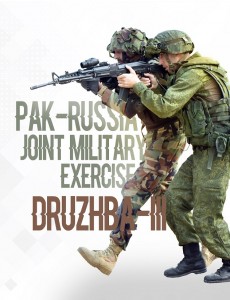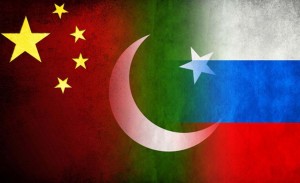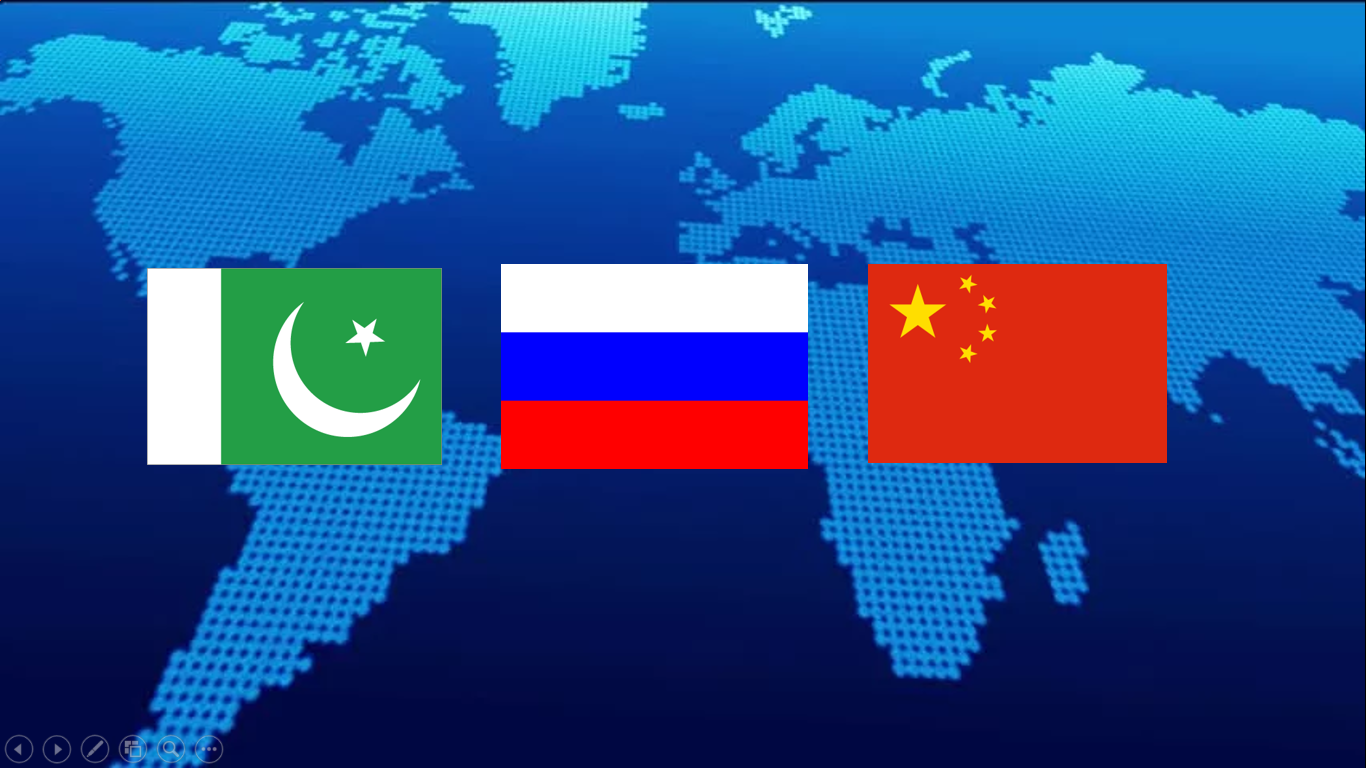China- Russia-Pakistan Strategic Alliance.
China and Russia—the former a rising power and the latter a great power that is currently striving to regain its lost glory—are, nowadays, at the center stage of geopolitics in Asia. Russia has traditionally been the most trusted ally of China’s neighbour and main antagonist, India. On the other hand, India is the biggest enemy of Pakistan too. It has fought wars with both China and Pakistan and has, even today, very tense relations with them. In this backdrop, India’s unprecedented tilt towards the United States of America—observed during the last few years—has rung alarm bells in all these three countries. Both countries have become strategic partners and have also signed deals for the supply of American weapons and missile technology to India. This state of affairs provides a significant variable to Pakistan, China and Russia to dramatically change the dimensions of their strategic relationship. It is in this backdrop that a China-Pakistan-Russia triangle is fast emerging as a bulwark against growing US presence in Asia and its protégée India.
The strong relationship between China and Pakistan, as illustrated most recently by the China-Pakistan Economic Corridor, has long played a key role in Asia’s geopolitics. However, broader regional developments over the last few months—including growing ties between Moscow and Islamabad and increasing cooperation in Afghanistan among Moscow, Islamabad and Beijing—also raise the possibility of a new coalition involving Pakistan, China and Russia. Regional developments, uncertain US policy and Afghanistan’s ongoing challenges increase the possibility of convergence of these three regional states. In the following write-up, the author has discussed various factors that are bringing these three countries together.
Pakistan-China Relations
Pakistan was the first country in the Muslim world to recognize People’s Republic of China (in 1949) and it established diplomatic ties with it in 1951. The relationship received an upward trajectory after the China-India war of 1962. Since then, both the countries are enjoying mutually reciprocated relationship passing through golden ages, and will strengthen further in the decades to come. Geo-economically and strategically both the countries are interdependent to safeguard their vital economic and strategic interests, and play complementary role for the attainment of their respective regional and global interests.
For China, the strategic partnership provides it considerable gains. The hand-over of Pakistan’s deep water Gwadar port to China for forty years can provide it access to trans-shipment facilities because it is closely located to the International Sea Lines of Communications. For Pakistan, this partnership provides all-embracing opportunities to get economic dividends through China’s economic initiatives like China-Pakistan Economic Corridor (CPEC) under Belt and Road Initiative (BRI) and Gwadar port. These projects will further reinforce the strategic and economic cooperation between these two states.
Russia Cosying up with Pakistan
Changes in the foreign policy goals and in regional and global orientations are the two factors that lie at the core of the changing nature of relationships between and among states. Both India and Russia have lost the convergence of interest they used to have on Afghanistan during the Cold War. In this scenario, the importance of Pakistan for Russia has come to the fore. Owing to Pakistan’s tilt towards the US and Russia’s extra inclination towards India, during the Cold War, both Russia and Pakistan could not build cordial relationship. However, that long established pattern seems torn apart as both countries are increasingly coming together. The major breakthrough in fostering better ties in the post-Cold War era, happened when on the invitation of President Putin, in 2003, President Pervez Musharraf went on a state visit to Russia. It served as an icebreaker to the dormant bilateral relationship of the two countries as it opened the window of opportunities to discuss their mutually beneficial relationship at the highest level. The lifting of arms embargo from Pakistan by Russia in 2014 paved the way for an upward trajectory in their bilateral relationship. The joint drills known as “Arabian Monsoon,” conducted between the naval forces of the two countries during 2014 and 2015, and joint exercises code-named “Druzbha” (Friendship) between their military forces in 2016, 2017, 2018 and 2020 is further strengthening the military aspect of the growing convergence in their bilateral relationship. Being aware of the complementary role that both can play for their respective geo-economic, political and strategic interests in the midst of changing political, economic and strategic regional landscape, Pakistan and Russia have been successful in developing cordial and collaborative relationship in the recent years. The cynicism of their past bitterness seems to disappear gradually.
Russia-China Bonhomie
Changes in global orientations, geopolitics, geo-economics, and opportunities for cooperation in energy and economic sector and maintaining regional strategic stability are the driving factors to forge a strong China-Russia-Pakistan triangle. The prospects of evolving of a strategic triangle among three states into a mature axis are considerably very high owing to their convergence of interest both in matters of economic development and security-related concerns.
For Russia and China, the common threat to their respective regional interests and main hindrance that limits their respective abilities in shaping the regional security environment is growing influence of US in their vicinity. For Russia, North Atlantic Treaty Organization (Nato) and for China, US alliances in the Indo-Pacific region is the chief potential threat to their interests. In this context the strategic partnership between China and Russia is grounded in geopolitical reality besides, a number of shared economic, strategic and diplomatic interest magnetically bring the two closer for cooperation.
The India Spanner in the Works
Strategic significance of India has increased in the eyes of US as it can play a vital role in containing China that has been a long-term goal of successive presidential administrations. India, having both nuclear and military power, enjoys a strong position in Asia; with US support, it has the potential to build up its military and economic prowess to stem the rise of China. The Indo-US alignment will serve the purpose of killing two birds with one stone; it will not only serve US interest in the region, i.e. containment of China, but will also disturb the balance of power between India and Pakistan helping the former to fulfil its desire to become a regional hegemon.
The Strategic Triangle
On the one hand, the ideological clashes of Russia and China with the United States brought them closer to engage in a strategic partnership against their common foe. They have joined hands to lessen US influence in their neighbouring regions such as Central Asia and Indo-Pacific. On the other hand, Pakistan and China too have a time-tested, strategic partnership against their mutual rival India to counterbalance its deep-rooted desire to become a regional hegemon. So, Pakistan, China and Russia are coming together because of their commonality of interests in the region. Hence, genuine security, geo-political and geo-economic interests are the main points of convergence of China, Russia and Pakistan.
The Afghanistan Factor
The US presence in Afghanistan, India’s growing involvement there, with tacit US support, and Afghanistan’s receptivity equally raise security concerns for Pakistan, Russia and China. Both China and Pakistan share borders with Afghanistan and have vested interests there. Russia is also a major stakeholder in Afghanistan that is boarded with its near abroad, Central Asia. Maintaining a peaceful and stable environment in Afghanistan is essential for security of these countries.
Afghanistan acts as a bridge for connecting Central, South, East and West Asia. The socio-economic, political and security stability of these regions is dependent on a stable and peaceful Afghanistan. So, establishing, and then maintaining, peace and stability in this war-torn country is a significant contributing factor for forging China-Pakistan-Russia strategic cooperation.
The current and looming (in the backdrop of US withdrawal) precarious security situation and the political turmoil in Afghanistan is another serious cause of concern for Pakistan, China and Russia equally. Therefore, owing to shared vital interests of a peaceful and stable Afghanistan and realization of the role this emerging trio can play in gaining a favourable situation there is the most imperative factor for the development of strong engagement among the three.
Geo-economic Factors
Economic and security considerations of China, Russia and Pakistan are highly interwoven and they motivate them to work collaboratively to deter any threat posed by Indo-US manoeuvrings in the region. That is why their cooperation and collaboration is not only limited to security and political matters but they are also expanding it in the economic realm. Russia’s joining of China’s Belt and Road Initiative (BRI) is one positive step in this direction.
Russia is keen to play the role of a prominent supporter and participant in the overall promotion and success of BRI. The signing of “Joint Statement on Cooperation on the Construction of Joint Eurasian Economic Union and the Silk Road Projects” in 2015 is the first concrete step in this regard. In response to Russia’s participation in BRI and Russian president Vladimir Putin’s proposal to connect the northern sea route with BRI during the first Belt and Road Forum on international cooperation, China announced in its Arctic Policy its readiness to build Ice Silk Road.
Since CPEC is the flagship project under BRI, the significance of the role that Pakistan can play owing to its blessed geo-strategic location cannot be undermined. The enhanced cooperation among China, Russia and Pakistan on BRI can promote it as a counterbalance to the US pivot to Asia policy. The mutual economic interdependency and mounting US sway in Asia strengthens the prospects of greater economic cooperation between these states.
Strategic Stability
For Pakistan, the prudence dictates that it must align itself with regional powers such as China and Russia with whom it enjoys convergence of interests on long-term basis. One thing that motivates Pakistan to strengthen its partnership with China and to reinvigorate its relationship with Russia is the greatest threat to its security posed by the arch-rival India. The US, with whom Pakistan is experiencing ‘half hatred, half trust’ relationship could not guarantee defending long-term dimensions of the security threats posed by India. The recent US tilt towards India and supporting its bid to join Nuclear Suppliers Group vindicate this fact. Thus, for Pakistan, seeking an alternate to US in the form of China and Russia is the need of the hour.
Russia sees the continuous rise of China promising to attain a balanced international system by chipping away at global preponderance of the US. Russia has, since long, relied on China as a major counterweight to the global dominance of US. So, both the countries are very well aware that coordinating their policies at regional and global levels will not only enhance their standing but will also make them able to better protect their interests amidst increasing US involvement in Asia.
Keeping in view its return to South Asia policy, Russia’s strategic and foreign policy calculus gives Pakistan a prominent position. Russia seems keen to rekindle its relationship with Pakistan with the intention of balancing out pro-America pivot of India after India’s resolve to fully cooperate with the US in Indo-Pacific for containing China.
Conclusion
The rapidly transforming international political structure is resulting in realignment of power relationships that were improbable previously. The emerging triangle of Russia, China and Pakistan vindicates the fact that how transformations in international political structure make the improbable, probable. Pakistan, apart from a staunch ally of China is gradually occupying special status in the strategic calculus of Russia. Growing US influence in the region, increased Indian involvement in Afghanistan backed by the US, expected US withdrawal from Afghanistan and post-withdrawal security situation in the country along with other factors are the compulsive factors for drawing Pakistan, China and Russia closer for greater cooperation in geo-economic and geo-political arena.
The writer is a member of staff.
 Jahangir's World Times First Comprehensive Magazine for students/teachers of competitive exams and general readers as well.
Jahangir's World Times First Comprehensive Magazine for students/teachers of competitive exams and general readers as well.



